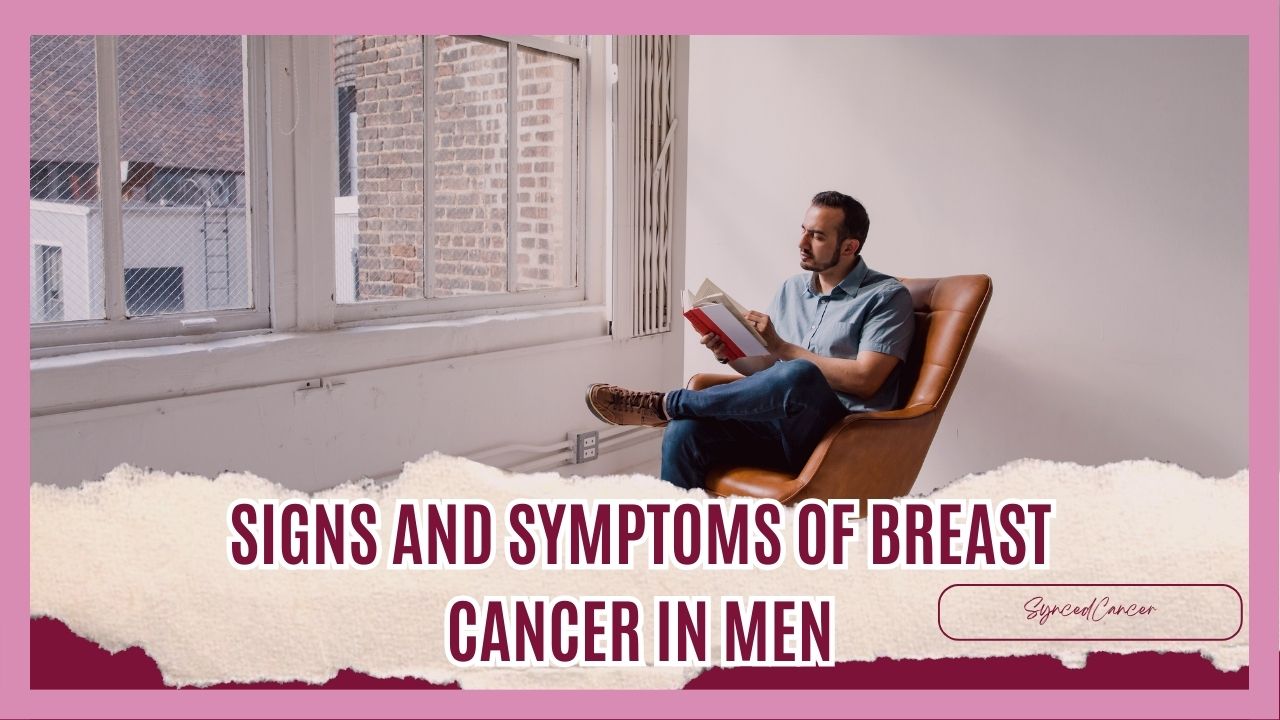Breast cancer is often associated with women, but it’s important to recognize that men can also develop this condition. While male breast cancer is less common than female breast cancer, it’s essential for men to be aware of the signs and symptoms to ensure early detection and effective treatment. Let’s see the signs and symptoms of male breast cancer and the importance of seeking medical attention if any concerning symptoms arise.
Understanding Male Breast Cancer
Male breast cancer occurs when malignant cells develop in the breast tissue of men. Though the exact cause is not always clear, factors such as hormonal imbalances, family history of breast cancer, obesity, and exposure to radiation or estrogen-related drugs may increase the risk.

Signs and Symptoms
Male breast cancer often presents itself with similar signs and symptoms as breast cancer in women. it’s essential to also note that breast cancer in men often doesn’t cause pain, and symptoms can vary greatly from person to person. Here are some signs and symptoms of breast cancer in men.
- Lump or Mass: The most common symptom of male breast cancer is a lump or mass in the breast tissue. This lump is usually painless but can be felt during self-examination or by a doctor during a physical examination.
- Changes in Breast Size or Shape: Any noticeable changes in the size or shape of the breast, such as swelling, dimpling, or puckering of the skin, should be examined by a healthcare professional.
- Nipple Changes: Changes in the nipple can also be a sign of male breast cancer. This includes retraction (turning inward), inversion (pulling inward), or discharge (bloody or clear fluid) from the nipple.
- Skin Changes: Male breast cancer can cause changes in the skin of the breast, such as redness, scaliness, or thickening of the skin.
- Pain: While breast cancer in men typically doesn’t cause pain, some men may experience discomfort or tenderness in the breast area.
- Enlarged Lymph Nodes: In advanced stages of breast cancer, lymph nodes in the armpit or around the collarbone may become enlarged.
Importance of early detection
- Early Detection Saves Lives: The foremost reason to seek medical attention for concerning symptoms of male breast cancer is that early detection saves lives. Studies have consistently shown that the earlier breast cancer is detected, the better the chances of survival. Early-stage breast cancer is associated with higher survival rates compared to advanced-stage cancer. catching male breast cancer early greatly improves the chances of successful treatment and long-term survival.
- Increased Treatment Options: Early detection of breast cancer allows for a wider range of treatment options. When breast cancer is diagnosed at an early stage, it’s often easier to treat and may require less aggressive interventions.
- Reduced Risk of Complications: Early detection can help prevent the spread of cancer to nearby tissues and organs, reducing the risk of complications and improving overall quality of life.
- Less Invasive Treatments: Early-stage breast cancer often responds well to less invasive treatments, such as lumpectomy (removal of the tumor) or partial mastectomy (removal of part of the breast), which may When male breast cancer is detected early, treatment options are generally more effective and less invasive.
- Emotional Well-being: Detecting breast cancer early can alleviate anxiety and uncertainty. Whether the symptoms turn out to be benign or related to a treatable condition, knowing the cause and having a plan of action can alleviate anxiety and uncertainty.
- Male Breast Cancer Can Be Aggressive: While male breast cancer is less common than female breast cancer, it tends to be diagnosed at a later stage, often because men are less likely to recognize the symptoms or seek medical attention promptly. As a result, male breast cancer can be more aggressive, making early detection even more critical.
- Symptoms Can Indicate Serious Conditions: Many symptoms of male breast cancer, such as a lump or changes in the breast tissue, can also be indicative of other serious conditions. Therefore, it’s essential to have any concerning symptoms evaluated by a healthcare professional to determine the cause and appropriate treatment.
When to Seek Medical Attention
It’s crucial for men to pay attention to their bodies and seek medical attention if they notice any changes as follows.
- Lump or Mass: If you notice a lump or mass in the breast tissue or underarm area, it’s essential to seek medical attention promptly. While not all lumps are cancerous, any new or unusual lump should be evaluated by a healthcare professional.
- Changes in Breast Appearance: Be vigilant for any changes in the size, shape, or appearance of the breast. This includes swelling, dimpling, puckering of the skin, or redness.
- Nipple Changes: Changes in the nipple, such as inversion (pulling inward), retraction (turning inward), discharge (especially if it’s bloody or clear), or scaling, should be evaluated by a doctor.
- Breast Pain: While breast pain is often not a sign of cancer, persistent or unexplained breast pain should be investigated further.
- Family History: If you have a family history of breast cancer or other risk factors, such as genetic mutations (e.g., BRCA1 or BRCA2), it’s crucial to be proactive about screening and monitoring for any changes in breast health.
- Regular Self-Exams and Screenings: Performing regular breast self-exams and participating in recommended screening tests, such as mammograms, can help detect breast cancer early, even before symptoms develop.
Conclusion
Male breast cancer is a rare but serious condition that requires awareness and vigilance. By understanding the signs and symptoms of male breast cancer and seeking medical attention, when necessary, men can improve their chances of early detection and successful treatment. Early detection of breast cancer is paramount in improving treatment outcomes and saving lives. By being proactive about breast health and advocating for regular screenings, individuals can play an active role in their own well-being and increase the likelihood of detecting breast cancer in its earliest, most treatable stages. Awareness campaigns and education are essential in ensuring that men and healthcare professionals are informed about this important health issue.



What do you think?
It is nice to know your opinion. Leave a comment.